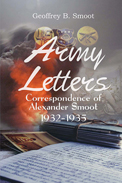
 |
Army Letters Correspondence of Alexander Smoot 1932-1935
by Geoffrey B. Smoot
PageTurner Press and Media
The author offers up collected letters written by his late father, Alexander, who joined the U.S. Army when the nation was in the throes of the Great Depression. The messages were mostly directed to Alexander’s widowed mother, whom he was trying to support, though his army pay was paltry. His first correspondence begins with “I’m in the Army now” and avers being “mixed up,” as in a dream. Most of his service was in Hawaii. The lucidly described scenarios of military life may surprise readers, as he often had too much spare time, participated enthusiastically in baseball, and once failed testing to rise above “buck private” because of flat feet.
Unlike some fellow soldiers, Alexander loved the mess hall food and enjoyed sometimes raucous socializing with his fellow soldiers. He finally became a private first class, enacting combat games against the invisible “Japs” in the island wilderness, an omen of cataclysmic future events. He listened to popular music and appreciated current news and family letters. In his final message before discharge, Alexander modestly asserted, regarding his Army experience, “Maybe I did pretty good after all.”
The author is a retired history teacher, and his painstaking work with this collection reflects that background. He recounts that his father attended college after leaving the military, gaining a career in America’s burgeoning industries. The letters are filled with interesting mid-1900s slang and socio-cultural observations. There are occasional messages expressing what can be seen as biases prevalent at the time, but Smoot assures readers that Alexander was always known to deal fairly with people of all backgrounds. Conveyed in Alexander’s lively style, the letters paint a vibrant and recognizable portrait of a country in crisis and military life behind the scenes. Smoot’s book is sure to attract both modern readers and those of an earlier generation.